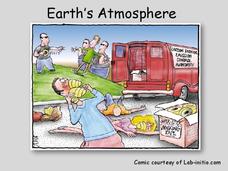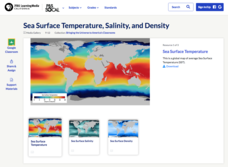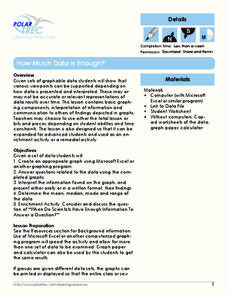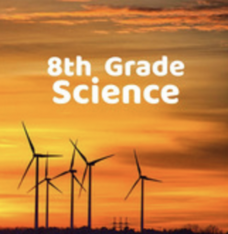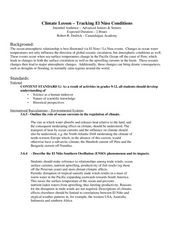Curated OER
Global Warming--Points of view
Students are introduced to global warming through analysis of political/editorial cartoons dealing with the subject. They discuss the cartoon and what the feel it means and then discuss the mechanics of and the concerns about global...
Curated OER
Physics- global warming
Students discuss the concept of global warming and view a multimedia clip on the global warming phenomenon. They statistically analyze mean temperature data and compare a given set of data. Data on atmospheric CO2 is done then they...
Curated OER
How Can Global Warming Be Slowed?
In this global warming worksheet, students review the causes of global warming such as deforestation, fossil fuels, and nitrous oxide. This worksheet has 6 matching and 4 short answer questions.
Curated OER
What Science Suggests About 'Weather Weirding'
Here is an activity that you can use to help upper elementary or middle schoolers to meet Common Core literacy standards for science and technology. Youngsters read the article on extreme weather patterns, "Weather Runs Hot and Cold, So...
Earth Day Network
Healthy Earth, Sick Earth
Earth is sick and needs our help! Read the children's book Planet Earth Gets Well to explain the various problems facing the planet, discussing what young conservationists can do to heal the planet along the way. A great Earth Day...
Chicago Botanic Garden
Albedo, Reflectivity, and Absorption
What is reflectivity, and what does it have to do with the Earth's climate? As reflectivity is measured by albedo, scientists can gather information on Earth's energy balances that relate to global warming or climate change. Budding...
National Academy of Sciences
CO2 and Temperature
Scientists can model global surface temperature with and without considering human emissions, but does do these factors really make a difference? Two interactive graphs demonstrate some factors that affect climate change. The first graph...
Curated OER
Praire Biome Models
Fifth graders, in groups, list the physical characteristics of a biome and think of ways in which animals might have to adapt to live there and make a biome mobile ball that show the different types of habitats that shape the praire biome.
Curated OER
Is Grandpa Right, Were Winters Colder When He Was a Boy?
Students compare current weather data to historic data to see if there is a temperature change. In this weather lesson students complete a lab activity and determine average changes in temperature, precipitation and cloud cover.
Curated OER
Greenhouse Gases
Although the worksheet for the lab activity is not included, this is an activating activity for your class to do when learning about the greenhouse effect. They lay three thermometers underneath a lamp: one out in the open, one under a...
Curated OER
Exploring Arizona's Biotic Communities Lesson 1: Mapping Biotic Communities
As part of a unit on Arizona's biotic communities, young ecology learners create a map. They describe how humans and animals adapt in their habitat. They take notes and create graphic organizers from articles they read. Beautiful maps,...
Curated OER
Feeling the Heat
Pupils record temperatures at different locations around campus. They examine the results and draw conclusions about how materials and colors affect the amount of heat produced. They also analyze Los Angeles' temperature records over a...
Chicago Botanic Garden
Seed Dispersal and Plant Migration
There are five methods of seed dispersal. They include gravity, mechanical, animal, water, and air. Scholars study seed dispersal in lesson five of the series of six. Through discussions, hands-on analysis of different seed types, and...
Curated OER
The Environment
Students explore the issues that influence our environment and research ways to decrease the negative impact that humans have on the environment. Misconceptions about environmental issues are addressed in this lesson.
Curated OER
Coral Bleaching in the Caribbean
Students practice analyzing images, maps and graphs from Internet-based educational resources. They explore the correlation between sea surface temperature and coral bleaching. Students comprehend that coral reefs are collections of tiny...
Polar Trec
Arctic Smorgasbord!
Two blooms of phytoplankton, instead of just one, now occur in the Arctic due to declining sea ice, which will have widespread effects on the marine life and climate. In small groups, participants build an Arctic food web with given...
Science Geek
Earth's Atmosphere
Ozone gas absorbs the harmful UV-B rays and helps protect humans. An informative presentation begins with the layers of the earth's atmosphere, the pressure and temperature in each of the layers, the ozone layer, the ozone cycle, and the...
PBS
Sea Surface Temperature, Salinity, and Density
Earth's vast ocean is full of mysteries! Science scholars discover the big-picture properties that influence its characteristics at different latitudes using a lesson from PBS's Weather and Climate series. After completing a background...
Polar Trec
How Much Data is Enough?
The next time you read a magazine or watch the news, make note of how many graphs you see because they are everywhere! Here, scholars collect, enter, and graph data using computers. The graphs are then analyzed to aid in discussion of...
NOAA
Water Cycle
Be water wise! Science scholars learn the water cycle on a global scale in part seven of a 13-installment series. The hands-on interactive allows them to explore Earth's water storage, types of precipitation, and the cycling of water...
Utah Education Network (UEN)
Utah Open Textbook: 8th Grade Science
The cycle of energy is important to many different systems on Earth. Scholars use questioning and observation to investigate the differences between renewable and non-renewable resources and how they relate to global changes. They...
Curated OER
Tracking El Nino Conditions
Students identify major changes in ocean temperatures during an El Nino season. In this climate lesson students complete an Internet assignment using datasets to determine periods of El Nino.
Curated OER
Travel Solutions to Global Warming
Students research and investigate the concepts carbon cycle and fossil fuels. They graph the carbon dioxide production as well as populations of six nations. Together they generate a variety of recommendations to reduce travel=related...
Curated OER
Global Warming
Students analyze the effect of global warming given a set of data. In this ecology lesson, students evaluate the impact of excess carbon dioxide levels to living things. They watch a video then investigate the major points of the film on...


















